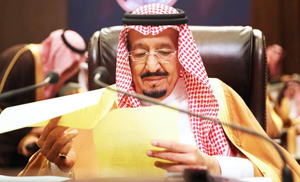Jordan, Mar 30: Arab leaders on Wednesday adopted the Amman Declaration, issued at the conclusion of the Arab Summit in Jordan, reiterating their readiness to have a historic reconciliation with Israel in return for its withdrawal from land it has occupied since the 1967 war.
 The declaration, read by Arab League Secretary-General Ahmed Aboul Gheit, said Arab states would back Palestinian-Israeli talks to end the decades-old conflict if it guaranteed the creation of a Palestinian state alongside Israel.
The declaration, read by Arab League Secretary-General Ahmed Aboul Gheit, said Arab states would back Palestinian-Israeli talks to end the decades-old conflict if it guaranteed the creation of a Palestinian state alongside Israel.
The Arab Summit — attended by 21 leaders — urged countries not to move embassies to Jerusalem and to reject unilateral Israeli moves that undermine the city’s identity. President Donald Trump has said he would move the US Embassy in Israel to Jerusalem.
The Amman Declaration says “peace is a strategic option” for the Arab world, based on a two-state solution.
It also calls for a settlement to the Syrian crisis that secures the aspirations of the Syrian people and the country’s unity and sovereignty, and removes the presence of all terrorist groups there, in accordance with the Geneva I communique and relevant UN resolutions, particularly 2254.
The declaration added that the crisis can only be solved via a political settlement with the approval of all Syrian components. It also underlined the need to support countries hosting millions of refugees.
The declaration said Arab leaders support Yemen’s legitimate government and a political settlement to the conflict on the basis of UN Resolution 2216, the Gulf Cooperation Council (GCC) initiative and the outcomes of the Yemeni National Dialogue.
It also expressed support for Arab Coalition efforts to support Yemen’s legitimate government.
The declaration said Arab leaders support the unity and stability of Iraq. It hailed the Iraqi government’s fight against terrorists, and its efforts to achieve national reconciliation that safeguards all components of society. It said Iraq’s stability is part of regional and international stability.
The declaration supports all efforts to reach a political settlement in Libya that includes all parties in a national dialogue, leading to solution that maintains the country’s unity, security and stability, and which serves the interests and hopes of the Libyan people.
Arab leaders vowed to take all measures to fight terrorism and extract it from its roots via a comprehensive strategy that entrenches democratic values and human dignity, and counters ignorance and exclusion.
Arab leaders also said they welcome good neighborliness with other countries based on mutual respect that boosts bilateral cooperation and rejects interference in the internal affairs of Arab countries, attempts to destabilize them, and sectarianism and sedition.
The declaration called on Iran to end its occupation of Emirati islands, and expressed support for the UAE’s efforts to reclaim the islands via all legal and political means.






Comments
Add new comment